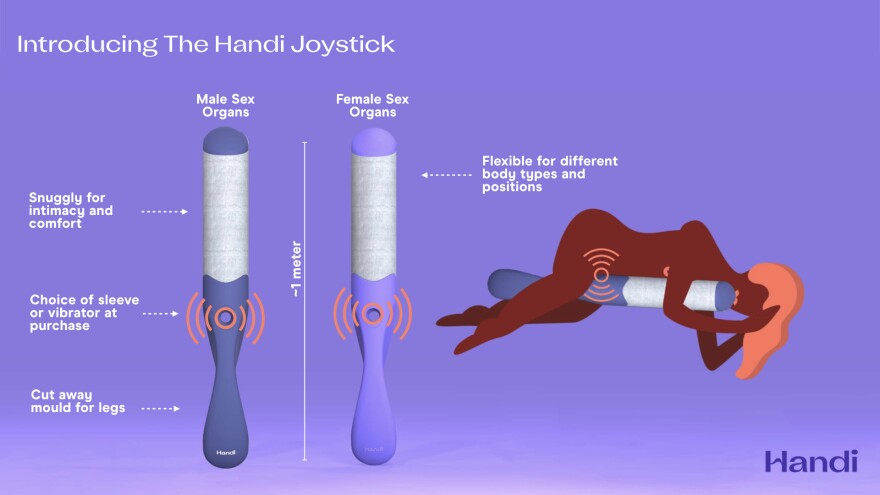There’s no shame in exploring sexual pleasure — connecting to what makes us feel good is a healthy and normal part of being human. And for thousands of years, sex toys have been a part of that exploration.
Today’s multibillion-dollar sex toy industry has roots in cultures across the world, dating back 30,0000 years. Technology has certainly evolved since those ancient times, but in recent history, more toy companies are moving away from primarily phallic-centered devices to ones inclusive of gender, anatomy, and mobility.
Host Anita Rao talks with the founders of two sex toy companies about the process of designing and creating toys for all bodies. Polly Rodriguez is the co-founder and CEO of Unbound, a company with a mission to design safe, affordable, and aesthetic toys. And Drew Gurza is the co-founder of Handi, a company designing accessible toys for and by the disability community. Sex blogger Epiphora, who has tested and reviewed toys for over a decade on her site heyepiphora.com, also joins the conversation to talk about how she helps consumers find the best toys for their bodies.
Interview Highlights

Drew Gurza on starting Handi, a company making sex toys for disabled people, with his sister:
At first, I was like: Hmm, do I want to make a sex toy with my sister? Feels kind of strange. … When we got home and started mulling over the idea some more, we put out a survey and found that 56% of people we talked to said they had trouble self-pleasuring. And we found that when we positioned the idea of a toy, 92% of the people we talked to said: We want a toy like this, it's about time. So we realized that it wasn't really about us anymore.

Polly Rodriguez on the history of sex toys:
The vibrator was created by a man, and it was a cure-all technology. I mean, it was advertised in the Sears-Roebuck catalog. … These products slowly became more stigmatized, especially as they started showing up in pornography when film was created in the 1940s. And so slowly, over time, they were kind of cast aside — obviously you don't see them in the Sears catalog anymore. But you had predominantly cis white men designing these products, and as a result, they often were very phallic. Because if a man is thinking about how do I want to design a product relative to sex, it is only natural that they would think it should look like a penis. And so, historically, that's why you saw a lot of these products that were often pink and plastic and very phallic-looking.
I remember a toy I had that was so strange because it looked like a penis, but it also had hearts on it. Why? Why did you put hearts on it?Epiphora
Gurza on how the Handi Joystick sex toy got its name:
Oftentimes, if we're lucky enough to discuss sex and disability, it's very dry and clinical and very medicalized. ... And we were like: There's fun in here.There's humor in this. That's part of why it's called the Joystick, because it makes fun of the fact that most people with power wheelchairs use joysticks. It’s a play on the fact that like, we can play with this, why shouldn't we make fun of it too.

Rodriguez on the difficulties of finding investors for a sex toy company:
Whenever I was pitching any venture capitalist, I always had to share my personal trauma and experience of going through cancer and menopause in order to validate the need and to prove the need of what we were building. There was so much pushback of: Do women really need this? Isn't this just for sad, lonely people? Which is really demoralizing when you're trying to build a company and gain traction and take on stigmas and taboos. I pitched for two and a half years in New York, San Francisco, LA, any city that would take me before I got my first yes from an investor.

Epiphora on the importance of honesty in a sex toy review:
Epiphora on her tone and style for reviews:
When I started reviewing, it was very, very common to see sex toy reviews that were very explicit, I suppose. And it's weird to say that, because there's no real wrong way to write a sex toy review. It's sex related, of course you're going to be referring to body parts and such. But I kind of mean: Writing a review to tantalize the reader and to turn on the reader or feeling like a review is supposed to turn on the reader — that's just not really what I've ever wanted to do with my reviews. Mine are more about imparting information and describing my experience.




